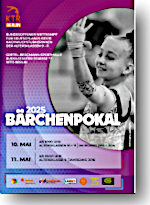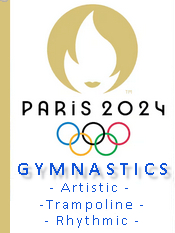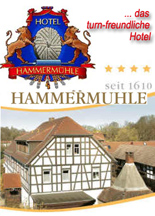Agnes KELETI - her last public interview
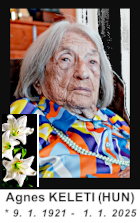 |
 On what would have been her 104th birthday today, the oldest living Olympic champion until her death a week ago, Àgnes KELETI, will be buried in the Hungarian capital Budapest.
On what would have been her 104th birthday today, the oldest living Olympic champion until her death a week ago, Àgnes KELETI, will be buried in the Hungarian capital Budapest.
Born as Àgnes Klein in Budapest on 9 January 1921, she changed her surname in 1940 for fear of persecution because of her Jewish origins. She began doing gymnastics at the age of four. With five Olympic victories, she is also the most successful Jewish athlete. Thanks to a new identity, she survived the Holocaust. After the 1956 Olympic Games in Melbourne (AUS), she emigrated to Israel. She only returned to Budapest in 2015. She worked as a coach, married twice and gave birth to two sons ...
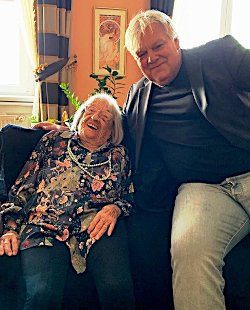 |
|
Agnes KELETI in her latest interview with sports reporter Gunnar Meinhardt (GER). |
In autumn 2023, German sports reporter Gunnar MEINHARDT was the last journalist to have the opportunity to meet the then 102-year-old legend of world sport in her hometown of Budapest in her last public interview and was impressed by this extraordinary personality.
"Àgnes Keleti embodied pure joie de vivre! You could see that from her face. Agnes Keleti was always smiling, that was part of her charisma. ‘I'm just happy to be in the world,’ she explained her constant cheerfulness, which often turned into a roar of laughter. Just like when we visited her on a sunny afternoon in autumn in her cosy old flat in the centre of Budapest. Sitting in a heavy wing chair, she could hardly contain her laughter when she greeted us by saying: ‘I speak German’ and in the same breath, despite knowing better, asked with a mischievous undertone: ‘Do you speak German too?’
Agnes Keleti also spoke English, Hebrew and Hungarian. In her answers, the tastefully dressed hostess - wearing a silk blouse printed with roses and black leggings, her neck adorned with a fine green pearl necklace - often switched between languages.

‘Aggi is in a really good mood today,’ said Rafael Bíró-Keleti (photo, right), her youngest son, who would prompt when his mum didn't quite understand a question. The renowned fashion designer runs a successful clothing company under the label ‘Keleti Budapest’. The 59-year-old deliberately chose the family name as the brand for his company. His mother also modelled for him from time to time.
.
In Hungary, almost everyone knows the name Àgnes Keleti!
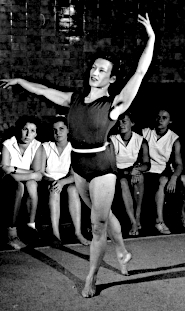 There she is honoured as a ‘heroine of the nation’. Wherever she performed, she was celebrated with standing ovations after all that the former gymnast achieved as a Jew, but also went through a lot:
There she is honoured as a ‘heroine of the nation’. Wherever she performed, she was celebrated with standing ovations after all that the former gymnast achieved as a Jew, but also went through a lot:
Being thrown out of the gymnastics club because of her heritage, adopting a new identity to survive the war, of which her father was a victim in a concentration camp. (* Photo, private, right: KELETI 1949).
After the five-time Olympic champion had become the most successful athlete in her country at the 1956 Summer Games in Melbourne at the biblical age of over 30, she first stayed in Australia for a while due to the Soviet invasion of her homeland, then went to Germany for several months and finally moved to Israel. She lived there near Tel Aviv for six decades before returning to the Danube metropolis.
In 2002, the most successful Jewish sportswoman in Oklahoma City was inducted into the "International Gymnastics HALL of FAME" (IGHOF) at the age of 81 years:
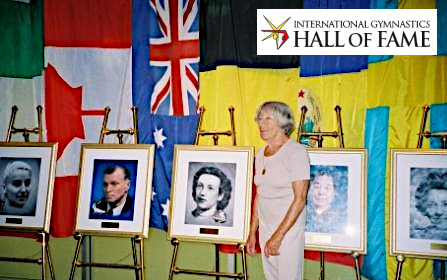
Àgnes KELETI - 2002 included in the gymnastics legends gallery (c) ighof
.
Àgnes Keleti was the longest living gold medallist in Olympic history until her death (1 January 2025) at 103 years and 357 days!
This record had previously been held by her compatriot Sándor Tarics. The water polo player won Olympic gold in 1936. He died on 21 May 2016 at the age of 102 years and 241 days.
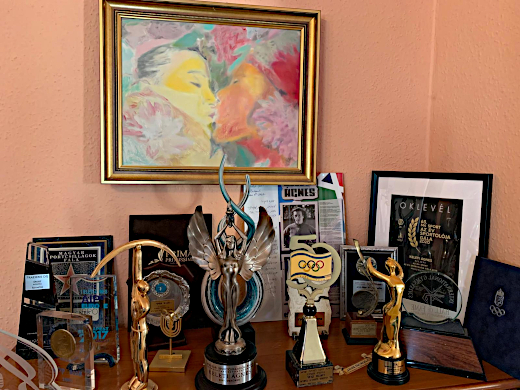
... this is just part of the Keleti trophies of the gymnastics legend!
.
♦ Her very last public interview - at the age of 102 - to the German sports journalist Gunnar Meinhardt in her flat in Budapest:
Gunnar Meihardt ( ... in the month of the unbelievably brutal Hamas attack) -: Mrs Keleti, in Israel, where you have spent more than half of your life, nothing is as it was after the Hamas attack. Can you still sleep peacefully?
Àgnes Keleti - : It's cruel, it's unbelievably terrible what's happening. Why, why do people have to be like this? I don't understand it. Let's talk about something else, please.
.
You are known as the "eighth wonder of the world". How do you like that?
À. Keleti - : (... with wide-eyed) Oh, typical of people, they always have to exaggerate. What have I achieved that is so extraordinary?
.
But now you're being modest.
A. Keleti - : I've always been like that. I've never taken myself too seriously. You don't always have to make everything unnecessarily bigger than it is. If you're modest, life loves you.
With ten Olympic medals, five of them gold, and a world championship title, you are not only the most successful Jewish female athlete, but you also achieved your fame at an age when others had long since retired from competitive gymnastics. You won your last Olympic title on 7 December 1956 at the age of 35 years and 333 days. No female gymnast has ever equalled that. Do you think that's normal?
A. Keleti - : Am I an abnormal person? ( ...laughs heartily) It was normal for me, otherwise I wouldn't have succeeded. I would have liked to have been successful earlier, but the political circumstances didn't allow it. The war and the anti-Semitic laws cost me ten years of my sporting career.
.
As a 16-year-old teenager, you won your first national championship title and were subsequently called up to the national team. You were supposed to compete in the 1940 Summer Games in Tokyo, but they were cancelled due to the war. Your career seemed to be over at this point after your nomination for an international match against fascist Italy was cancelled because you were Jewish. How much did that affect you?
À. Keleti - : I was incredibly sad, especially as nobody knew what would happen next. As a child, I had wanted to be a musician. I had learnt the cello and played professionally for many years after the war to earn money. (She suddenly stops and fervently intones the melody of some of her favourite pieces for several minutes. Afterwards she asks if she liked it.)
.
Why did you decide against music and in favour of a career in gymnastics?
À. Keleti - : My father always wanted to have a son. That's why he brought me up like a boy. We were often out in nature, hiking, I climbed trees, we rowed regularly. I was constantly on the move, I couldn't sit still. And as a cellist, all you do is sit, which I couldn't bear. I continued to play my instrument, but I thought it would be better to dedicate myself more to gymnastics.
.
Until you were expelled from your club and it was just a matter of survival. Your father, his uncles and other relatives were deported to Auschwitz and killed by the Nazis. You, on the other hand, paid a Christian maid to use her identity. Under the pseudonym Yuhasz Piroshka, you adopted a rural accent and worked in a village as a furrier and housekeeper for a family of Nazi sympathisers. In 1944 you hastily married your gymnastics colleague István Sárkány because you believed that this would prevent you from being sent to a labour camp. Six years later, you divorced.
À. Keleti - : ... yes, that was the case! I am infinitely happy to have survived that time.
.
Your mother and your sister Vera, who was seven years older than you, went into hiding and were rescued by the Swedish diplomat Raoul Wallenberg, who found a place for both of them in a ‘Swedish house’ in Budapest. In the last winter of the war, it is said that you collected corpses every morning during the siege of the capital by the Soviet troops in order to lay them in a mass grave for burial.
How did you deal with that?
À. Keleti - : Although everything was indescribably terrible, I never lost my positive thinking. I'm not afraid either, I've never been afraid. I have been an optimist all my life, driven by a love of life, there is no other way. I always told myself that the brave would be rewarded at some point.
.
That was not yet the case in 1948, after you had started your comeback on the gymnastics stage in order to fulfil your Olympic dream by taking part in the 1948 Summer Games in London.
À. Keleti - : I had a lot of bad luck back then. I was qualified, but two days before the start of the competition I tore a ligament in my ankle and had to watch our team win the silver medal.
.
Her glory days followed in 1952 in Helsinki and four years later in Melbourne. Which of your Olympic medals is most important to you?
À. Keleti - : You will be surprised, but I was less interested in winning than in travelling. Travelling the world and getting to know different cultures has always been my greatest hobby. Also because I had experienced war and communism. I just wanted to be free and I got that feeling from travelling. My dream island is Bora-Bora, it's incredibly beautiful there. My last trip before corona started was to Barcelona. After the pandemic ended, I no longer dared to go on longer trips. Although, I'm still going strong...! (As she says this, she stretches her right arm out in front of her body in a flash and holds out her hand for me to take. After I respond, she suddenly pulls me towards her with unbridled energy. She beams like a winner and asks: ‘So, am I still strong?’
Without waiting for an answer, she says that she would like to reveal a less pleasant secret about the medals.)
.
Please, do it!
À. Keleti - : I lost my team gold medal from the 1956 Olympics, so a replica was made. It was presented to me eleven years ago at a ceremony by our then President Pál Schmitt. It made me feel so uncomfortable! I had just arrived from Tel Aviv and was in such a hurry that I had to change in the airport toilet. In the rush, however, I had forgotten to take my underwear with me. So I had nothing on under my pretty dress, oh dear, that was embarrassing (... laughs out loud). Luckily nobody noticed.
.
Her closest rival at her second Summer Games was Larissa Latynina, the most successful female Olympian in history. She lives near Moscow. Do you have contact with her?
Ihre ärgste Rivalin bei Ihren zweiten Sommerspielen war Larissa LATYNINA, die erfolgreichste Olympionikin der Geschichte. Sie lebt in der Nähe von Moskau. Haben Sie Kontakt zu Ihr?
A. Keleti - : Why should I?
Doesn't it excite you to meet her again?
À. Keleti - : No!
.
But you sound bitter. Do you hate Russians?
À. Keleti - : She should stay where she is. My trauma at the hands of the Russians has not been forgotten. In 1956, my life was radically changed for a second time by the invasion of the troops. If that hadn't happened, I certainly wouldn't have emigrated to Israel.
.
Where you lived for six decades, married a second time and gave birth to two sons. You worked as a sports teacher at Tel Aviv University and at the Wingate Institute for Sport in Netanya and coached the Israeli national team until well into the 1990s.
Why did you return to Hungary in 2015?
À. Keleti - : Because I wanted to be with Rafael, who had also moved back to Budapest. I feel most comfortable around him. Daniel, my other son, lives in Australia. But the move wasn't easy for me. I felt like I was in paradise in Israel. What's happening now is all the more terrible. Why can people be so brutal?
You experienced enough inhumanity during the Second World War. How do you deal with the Germans today?
.
You experienced enough inhumanity during the Second World War. How do you deal with the Germans today?
À. Keleti - : Of course there was great anger towards everything German after the war. That's why I couldn't stay in Munich in 1957, even though I had a romantic relationship there and the man wanted to marry me. But time healed my wounds. Believe me, if I had been bitter forever, I would never have driven a VW Beetle in Israel for so long. I did that until 1987, and it wasn't until I crashed into the wall of a supermarket one day due to carelessness that I told myself I was done driving.
What gives you the satisfaction you have now?
A. Keleti - : : I'm just fine. ( ... She stretches both legs out straight as a die and moves them up and down in parallel for a while. She points to her abdominal muscles with her index finger and says proudly: ‘Now you're amazed, aren't you ...?’
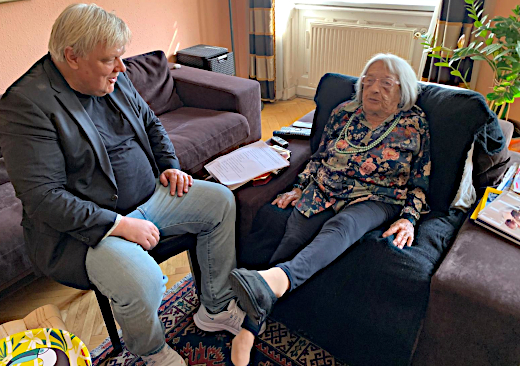
(c) gymmedia / G. Meinhardt
.
Oh, yes, it's marvellous how fit you are!
À. Keleti - : Look around where and how I live: I have great people who help me when I need it. I know what to do with my time, I read a lot, but without glasses, I often watch sport on TV, like the recent World Gymnastics Championships with Simone Biles, who did a fantastic job, I go out in the fresh air every day, I like to have a beer and I never look in the mirror because that keeps me young.
But now I would like to tell you something else ...:
... and that is?
À. Keleti - : That was my last interview! There's nothing more to tell about my life and it has to end one day.
Now the time has come!
+ + +
* * She gave this, her last public interview according to her son's confirmation, to the German sports journalist Gunnar MEINHARDT in October 2023 at the age of 102!
* Photos: Gunnar Meinhardt (GER)
(c) Translated by gymmedia
♦ SUPPLEMENT -:
As she was an Israeli citizen for a time, Israeli media raised the question of whether the Hungarian Olympic legend should be buried in the country.
According to her family, however, she will be buried in Budapest in accordance with her personal wishes, on the day of her 104th birthday, at the Jewish Cemetery in the Hungarian capital.
- Keleti's death marked the end of an era. Charles Coste, a French cyclist and 1948 Olympic champion, is now the oldest living Olympic champion.
- Ágnes Keleti's legacy, however, remains eternal and inspires future generations.
- Keleti's achievements went far beyond sport; she received numerous honours, including the Fair Play Lifetime Achievement Award, the Prima Primissima Award and honorary citizenship in Budapest, in Újpest and Terézváros, as well as being included in the Gallery of Century Gymnastics Legends of the "International Gymnastics Hall of Fame" .
.
♦ 2023, the documentary film ‘Conquering Time’
by Oláh Kata honoured her life ..:
... and received recognition from the International Sports Press Association (AIPS).
* Youtube
.



 GERMAN VERSION
GERMAN VERSION











